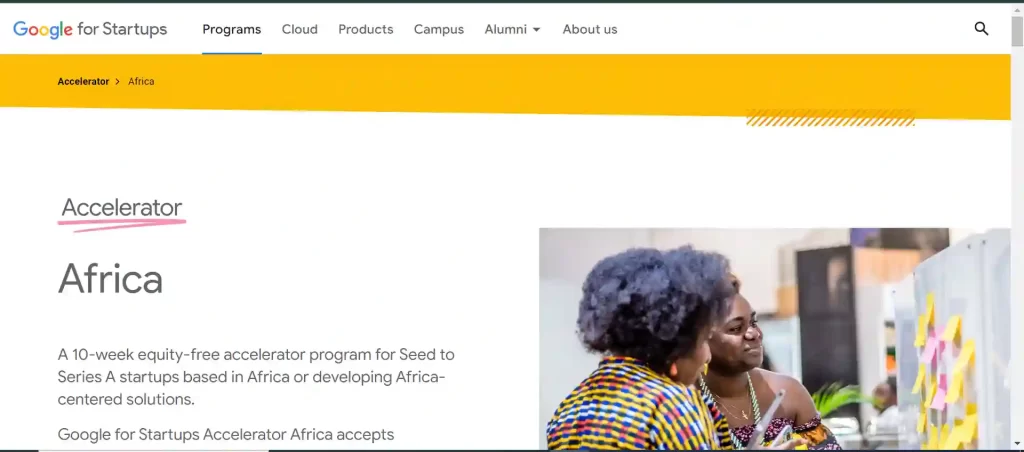Over the past few years, accelerator programs have transformed, particularly in terms of diversity and inclusion. Google for Startups is an example of such accelerators. As the startup ecosystem becomes more aware of the need for diversity and representation, Google for Startups, like many other accelerators, are taking steps to ensure that their programs are accessible to a wider range of founders.

Specifically, Google for Startups is a series of global accelerator programs that, since its inception in 2018, has bolstered 106 startups and raised $263 million, majorly for the African continent. Additionally, Google for Startups has created more than 2,800 direct employment opportunities. In 2024, Google for Startups has taken in the 8th cohort of startups for its accelerator program. For this cohort of startups, the focus is on artificial intelligence (AI) and machine learning (ML) to unlock new opportunities and help address Africa’s critical challenges through the digital transformations taking place across the continent.
What are the Features of Google for Startups Accelerator Program
Google for Startups has a series of accelerator programs tailored for startups across the world, such as Google for Africa startups. Each of these accelerator programs accommodates 10-15 startups to help them tackle specific technical challenges and to spur their business growth. The startups can either participate in-person or remotely in sprint projects and group learning sessions as they work toward solving some of Africa’s problems.
Another feature of the Google for Startups accelerator program is specialist deep dives, where startups participate in workshops anchored on leadership development for founders, customer acquisition, and product design. This feature is integrated with tailored expert help, where founders of startups are paired with relevant experts to solve the technical challenges they experience in running their startups, thereby facilitating the growth of the startups.
What are the Benefits of Joining Google for Startups Accelerator
The greatest advantage of Google for Startups is that it is equity-free for the three months that startups get to participate. The benefit of an equity-free investment that Google for Startups provides is that there is no form of a loan you are required to repay the investor through a stake in the company. Most investors in accelerator programs take an average of up to 7% non-negotiable equity, meaning that they will share in your success. This can be discouraging because these investors provide limited funding. Hence, an equity-free investment is a good start.

The accelerator program also gives participating startups up to $350,000 in Google Cloud credits to help them scale their infrastructure and technology. In layman’s language, Google Cloud credits are beneficial for startups, particularly if they are in the tech and innovation space, where you need cloud computing tools and services. These are often costly hence the cloud credits Google for Startups provides are a great form of support that startups can use to improve the outcomes of their projects and realize their long-term goals.
Google for Startups also has a great mentorship program called custom mentorship, where startups receive tailored leadership and product support from industry experts and Google mentors. There are other forms of support, such as Google product support, technical project partnerships, and founder networks. Within these programs, startups get to learn product tips and tricks directly from those who built them, work hand in hand with experts from Google on their biggest tech challenges, and connect and learn from fellow founders while also accessing a peer-to-peer support network.
If you have been in the startup ecosystem, I am sure you understand the significance of the aforementioned benefits. These are advantages that are not easy to come by when you look at the offerings of other accelerator programs. Google for Startups, through the nature of its accelerator program, provides participating startups with an opportunity to scale easily and break even in a shorter period of time.
Other benefits that specifically apply to the Google for Startups accelerator program for Africa include early access to Google’s new products and tools as relevant, support on the company’s and products’ strategy, and training through exclusive invitations to technical boot camps hosted by Google where offered.
What are the Entry Criteria for Google for Startups Accelerator Program?
Google for Startups has different sets of programs, but there are general entry criteria that a startup aiming to join the accelerator must meet. One includes a commitment from at least one of the startup’s technical personnel or the chief technical officer (CTO) to engage and participate in the program’s required sessions. This criterion is intertwined with ensuring the startup is deeply technical, leveraging either machine learning, artificial intelligence, or both.
Your startup must also be building a scalable service or product, with a defensible growth model and addressable market. Lastly, the startup must demonstrate traction between seed to series A stage to qualify to become part of Google for Startups.
The accelerator program for Africa within Google for Startups is called AI First. It is a 10-week program that allows startups that are only Africa-centered in terms of the products and services developed. The products and services the African startups are developing must also be using artificial intelligence to achieve the intended transformation.

In summary, Google for Startups, especially the accelerator program for Africa, is a good fit for any accelerator with a vision of transforming any sector in the continent using machine learning and artificial intelligence. Due to the benefits associated with the accelerator program, it is expected that entry might be challenging due to high competition. Therefore, if you are looking to get into the program, you should ensure your startup meets each of the many criteria identified and offers a unique solution to the challenges Africa is facing. Best of luck!
Related Article:
